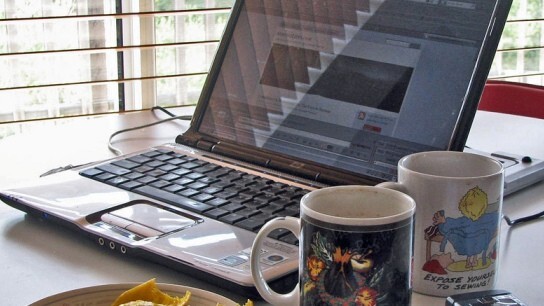
A new study suggests that more than half (60%) of office-based employees will be ‘regularly’ working from home within the next decade, thanks to technological advances in the workplace.
The Virgin Media Business report also notes that face-to-face meetings with customers will change, with 72% of the subjects believing that it will soon be a thing of the past.
The research was carried out by LM Research between 12 December and 16 December 2011, and surveyed 5,000 directors and business-owners from UK companies with 100+ employees. The report also notes that businesses are already putting plans in place to support the changes, with access to super-fast connectivity as standard now a top investment priority for firms as they prepare for staff to work away from the office in the years to come.
“There’s a change coming to the way we work,” says Tony Grace, Chief Operating Officer of Virgin Media Business. “Remote working isn’t anything new, but with technology providing the right tools for the job, the acceptance that it will soon be the norm is.
“Businesses are already getting fit for purpose by investing in cloud-based software, virtual private networks or investing in new tools such as Unified Communications to ensure that remote teams remain connected and engaged, ” he continues. “The growth in video and social media across corporate networks is also supporting this migration away from the traditional office confines; the importance to underlying network infrastructure once more comes under the spotlight.”
Okay, it is of course in Virgin Media Business’s interest to pedal such claims, given that its own services would fit into that scenario rather nicely. But there is a definite shift towards a home-working ethos, which is very much underpinned by the Internet and Web-based technology.
Earlier this month we reported that UK mobile network O2 was letting 3,000 employees work from home for the day, essentially its entire Slough HQ representing a quarter of its 12,000-strong workforce.
The flexible working pilot aimed to “push the boundaries” of what can be achieved through flexible working arrangements. But it also had at least one eye on the Olympic Games this year, with travel disruption a likely by-product of the swarm of tourists that will descend upon the city this summer.
But O2 is hoping that the trial will act as a test-bed for future scenarios beyond the Olympics, with flexible working helping to increase efficiency, productivity and innovation. O2 will look at reductions in its electricity usage, CO2 emissions and travel time, and the company’s three year sustainability plan pledges to help over 125,000 business employees work flexibly, and collectively save over 500,000 miles of travel.
“We believe a cultural step-change is underway affecting staff and businesses, as work increasingly becomes something we do, rather than a place that we go,” said O2 Business Director, Ben Dowd last week. “[The] office-wide flexible working initiative is an opportunity for us to take the next step on our flexible working journey and tangibly demonstrate the opportunity and potential available to British businesses today.”
For the two months leading up to the day, a team of 20 people had been working behind the scenes to prepare for O2′s first ever fully flexible working day, ensuring that its employees could access the necessary tools, services and support to work remotely.
Home-working kickbacks

There’s a number of kickbacks for adopting a work-from-home philosophy. The capital’s public transport network caters for 25 million journeys every day. And if the predictions of the UK’s business leaders in this latest report come to fruition, this number could be brought down significantly. Also, with the average desk in London costing £285 to per person per month, companies could save themselves a lot of money.
“This raises questions about the way businesses currently use office space,” says Grace. “We see the office of the future being a lot smaller, desks set-up for hot-desking and a workforce that can easily interchange from working in the office to working from home or at a satellite office. Underpinning all of this will be a reliable network helping companies to manage their staff and resources.”
Indeed, there will always be a need for a bricks-and-mortar office, particularly for big businesses, as virtual conversations can only achieve so much. But remote-working can be a quick-win solution to a number of problems, such as work/life balance, whilst alleviating the congestion on London’s trains and buses.
The workplace in ten years time could be a vastly different place to what we see today, and as long as companies can effectively monitor the quality and quantity of work, it will be a winner on many fronts. However, it probably won’t work for everyone – some people only work well under the watchful eye of a supervisor.
Get the TNW newsletter
Get the most important tech news in your inbox each week.




